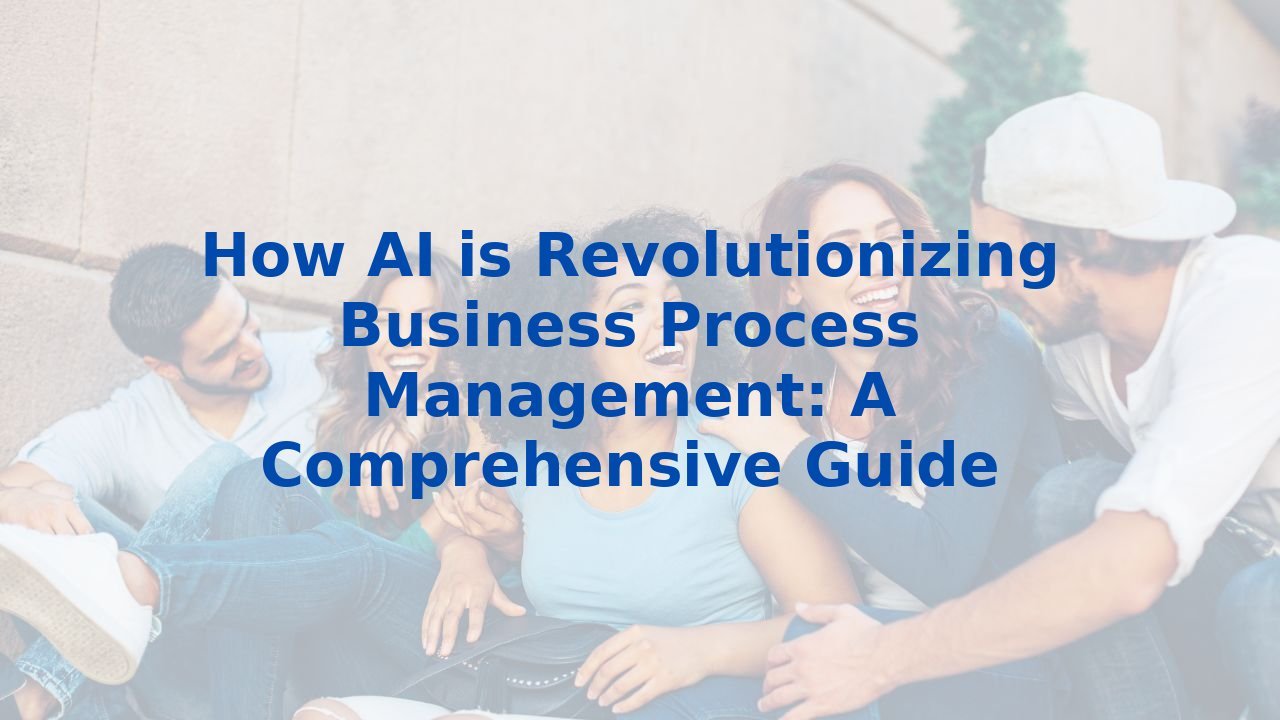How AI is Revolutionizing Business Process Management: A Comprehensive Guide
How AI is Revolutionizing Business Process Management: A Comprehensive Guide
In the dynamic landscape of modern business, efficiency is no longer a luxury; it’s a necessity. As organizations continuously strive to enhance productivity and streamline operations, the integration of Artificial Intelligence (AI) into Business Process Management (BPM) emerges as a significant game changer. This comprehensive guide explores how AI is revolutionizing various business processes and underscoring the transformative benefits that accompany this integration.
The Transformative Role of AI in BPM
AI revolutionizes key aspects of BPM, including process discovery, mapping, automation, and continuous improvement, empowering organizations to work smarter, not harder.
1. Process Discovery: Unveiling Hidden Efficiencies
At the core of BPM lies process discovery, a phase where AI shines brightly. By harnessing cutting-edge technologies like process mining and natural language processing, AI reveals existing workflows within an organization, often exposing hidden inefficiencies that traditional methods fail to unveil. Gone are the days of relying solely on employee interviews or manual data analysis; AI accelerates the discovery process, analyzing vast amounts of operational data with unmatched precision and speed.
2. Process Mapping: Creating a Blueprint for Success
Once processes are discovered, AI takes the reins in process mapping. With machine learning and data analytics, AI visualizes workflows and creates actionable blueprints that illustrate how processes interconnect. This dynamic approach ensures that process documentation evolves in real-time, allowing organizations to stay agile and responsive to shifting business needs. Such adaptability is vital in maintaining operational excellence.
3. Process Automation: The Workhorse of Efficiency
Among the most palpable applications of AI in BPM is process automation. AI-driven automation tools enable organizations to delegate repetitive, rule-based tasks to machines, transforming the way work is executed. Whether it’s data entry or customer inquiries, AI operates around the clock, performing with remarkable accuracy. This shift not only boosts operational speed but also liberates human talent to tackle strategic initiatives, thereby enhancing overall productivity.
4. Process Management: Continuous Improvement
AI's capabilities do not stop at mere automation. It actively monitors processes, drawing on historical data to anticipate potential issues. By employing predictive modeling and root cause analysis, AI offers actionable insights that drive continuous improvement. This iterative approach ensures that BPM strategies remain relevant, allowing organizations to align with evolving objectives and industry standards.
5. AI in Process Optimization: Enhancing Efficiency
AI also plays a crucial role in optimizing business processes. By using machine learning algorithms to enhance decision-making, organizations can harness predictive analytics to uncover risks and opportunities. AI streamlines process simulations, analyzing historical data to identify patterns and support KPI calculations. This strategic foresight empowers organizations to gauge the impact of process changes before implementation, reducing the risk of adverse effects.
6. Benefits of AI in BPM
The advantages of integrating AI into BPM are manifold:
- Faster Results: Automated processes execute tasks in real-time, delivering quicker outcomes that enhance responsiveness.
- Better Decision-Making: AI equips decision-makers with extensive data and alternative scenarios, facilitating more informed choices.
- Higher Quality and Efficiency: AI continuously monitors operations, minimizes errors, and ensures high standards are met across processes.
7. Training Employees for AI: The Key to Success
While AI has the potential to transform BPM, its true power is unlocked when employees are adept at engaging with these technologies. Therefore, investing in training programs is essential:
- Understanding AI Capabilities: Employees must be educated about the working principles of AI and its scope.
- Adapting to AI-Driven Processes: Teams should learn to collaborate with AI systems effectively, making the most of their strengths.
- Developing Skills for an AI-Driven Workforce: Continuous skill upgrades are crucial to navigate the evolving business landscape, ensuring employees stay relevant.
Conclusion
The integration of AI into Business Process Management heralds a new era of operational excellence. By leveraging AI for process discovery, mapping, automation, and optimization, organizations can glean unparalleled insights and efficiencies. However, such technological advancements must be paired with robust employee training to fully unlock their potential. As the business landscape evolves, those who embrace AI within their BPM strategies will naturally find themselves positioned at the forefront of innovation and success.
For organizations looking to equip their workforce with essential AI skills, explore Complete AI Training for comprehensive programs that can transform your approach to business.



